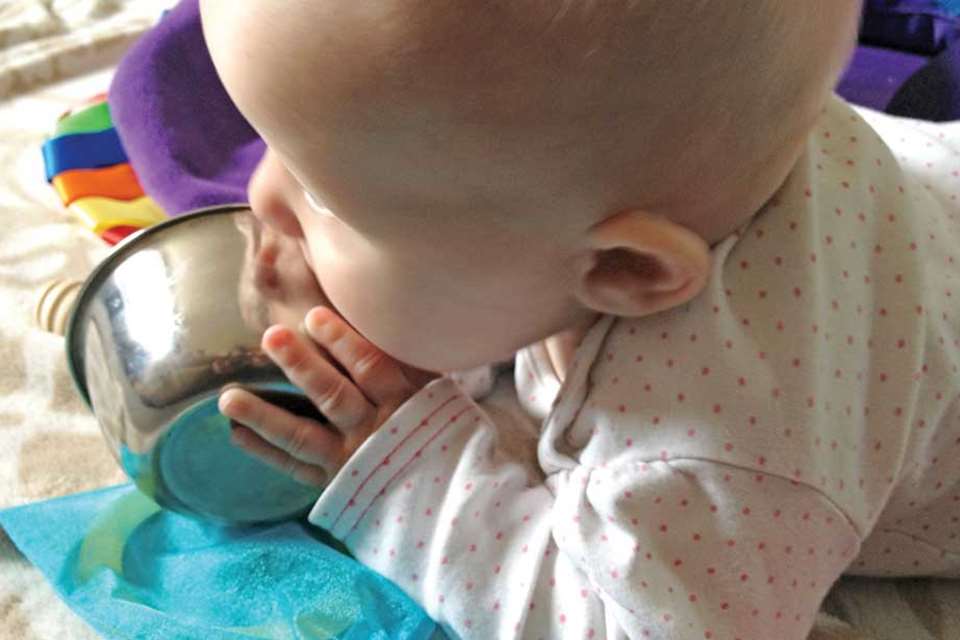Enabling Environments: Collections - All in hand
Nicole Weinstein
Monday, May 4, 2015
How can settings support the development of small hand movements? Nicole Weinstein advises.

Pencil control is an area that causes much debate in the early years. Not only is there controversy about what age a child should be able to hold a pencil, but Finland will stop teaching handwriting as a skill from 2016. The rationale is that handwriting is an obsolete skill and the time taken to acquire, rehearse and refine the motor skills is out of proportion to how it will be used in the future. Instead, children in Finland will be taught to touch type and text message, skills which are 'more relevant to everyday life', according to the Finnish National Board of Education.
With this in mind, what is the importance of fine motor control for today's children? And what resources should early years settings have in place to support children's development of small hand movements that are vital for use in everyday life?
Big movements
Eating, drinking, dressing and playing are all daily tasks that require small movements of the hands. Numerous parts of the brain and body are working together in a complex sequence of events to complete these tasks. But before children can learn to feed themselves, grasp small objects, fasten their clothes, or be able to hold a pencil, they have to have had the experiences and repetition of movements that will allow them to be able to hold their heads up, sit upright, get to their feet and eventually be mobile.
Director of www.activematters.org Dr Lala Manners says, 'Gross motor skills dictate the rate at which fine motor skills are acquired. If children have enough movement experience on their tummies when they're little - rocking, swaying, turning, crawling, creeping - these will stimulate the vestibular and proprioceptive systems, which are directly related to learning, in terms of being able to sit still, hold their head in the right position and become spatially aware.'
Our bodies develop from top to bottom and from inside to out. That being the case, fingers are one of the last parts of our body to get moving, so it is vital that practitioners put out play experiences for children to develop them. Treasure baskets, heuristic play, messy play, small-world play, gardening, cooking, gluing, cutting, painting, weaving and threading are activities that help strengthen the small muscles in the hands. And, in light of ICT being a more prominent feature of many children's lives, it has never been more important to offer these experiences as part of core provision.
Researching resources
Sue Gascoyne, author, therapeutic play practitioner and creative director of Play to Z, launched a small-scale research project in 2013 with outdoor play expert Jan White, exploring how hand positions vary with age, and whether there is a potential relationship between particular types of resources and hand movements.
Observations on 82 children aged between four months and seven years were carried out in the UK in a range of early years and after-school settings. Ms Gascoyne says, 'The range and intensity of hand movements differed widely between different areas of provision depending on the age of the child playing. Only eight different types of hand movements were seen in the children, aged four to seven years, observed playing with loom bands. Compare this with the children aged nought to six years, but mainly babies, playing with objects such as those found in a treasure basket or heuristic play, and 23 different types of actions were seen.
'In summary, while loom bands would not typically be played with in early years settings, resources like these, together with screen-based activities, may predominate at home, which makes it all the more important to offer children rich-ranging and sensorial play opportunities in day care to provide a balance of activities.'
RESOURCES TO SUPPORT FINE MOTOR SKILLS
Malleable materials and tools
Provide playdough, shaving foam, dried foods and cornflower and link to role play such as baking, building and mechanics or potion making. This will support children to develop their fine motor skills while playing imaginatively and is a way to engage those children reluctant to sit at table-top activities. Try Air Hardening Clay (£3.90), Rainbow Swamp Gel 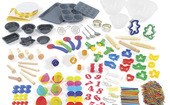 (£11.99) or Popcorn Kernels (£1.25) from Cosy Direct on 01332 370152 or www.cosydirect.com. Or the Dough Resource Collection (£150) from www.earlyexcellence.co.uk
(£11.99) or Popcorn Kernels (£1.25) from Cosy Direct on 01332 370152 or www.cosydirect.com. Or the Dough Resource Collection (£150) from www.earlyexcellence.co.uk
For a range of different tweezers try the Squeezy Tweezers (£7.99 for six), Cheap Waterplay Tongs, (£6 for six), Jumbo Tweezers (12 pack for £9.45), Tea Strainer (two pack for £2.79), all from Cosy. Or try the Tweezers, 12cm (£8.99 for six) or the Plan Toy Beehive (£18.99), both from www.reflectionsonlearning.co.uk
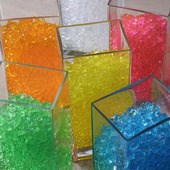 For squeezing techniques, try the Turkey Basters (three-pack for £3.79), The Easy Squeeze Set (£22.99), Pipettes (50 pack for £2.49), and 6 Jumbo Eyedroppers with Stand (£10.95), all from Cosy.
For squeezing techniques, try the Turkey Basters (three-pack for £3.79), The Easy Squeeze Set (£22.99), Pipettes (50 pack for £2.49), and 6 Jumbo Eyedroppers with Stand (£10.95), all from Cosy.
More tools include Potion and Perfume Bottles (15 pack for £3.95), Tuff Tubby Volume Spoons (£7.99), Garlic Press (£6.49) or Whisks (£6.95), all from Cosy.
Sand, water and mud
Water Resource Collection (£240), Wet Sand Resource Collection (£195) and Dry Sand Resource Collection (£175), from www.earlyexcellence.co.uk.
Mud Pie Kitchen (£32.99), Mud Pie Baking Kit (£32.95), Mobile Mud Kitchen (£125), Water Wall Starter Kit (£25.95), all from Cosy.
Treasure baskets and heuristic play
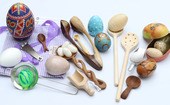 Playscope Large Treasure Basket, 10 months plus (£168), Mini Stacking Hoops (£33), The Discovery Set (£57), Egg and Spoon Collection, Ball and Hoop Collection and Hide and Seek Collection, (£60 each) from www.playtoz.co.uk
Playscope Large Treasure Basket, 10 months plus (£168), Mini Stacking Hoops (£33), The Discovery Set (£57), Egg and Spoon Collection, Ball and Hoop Collection and Hide and Seek Collection, (£60 each) from www.playtoz.co.uk
Heuristic Play Starter Set (£58.99) from www.hope-education.co.uk.
Pound Shop Treasure Basket Kit (£9.95) from Cosy.
Weaving, threading and games
Weaving Dragonflies and Butterflies (£29.95 for four) and Threading Trees (£49.95 for three), from www.tts-group.co.uk.
Large Lacing Shoe (£13.50), Lacing House (£9), Disc Game Tree (£11.50), and Fish Catch Maxi Pack (£19), all from www.wesco-eshop.co.uk.
Crocodile Wall Game (£119), Giant Pegs and Pegboard Set (£9.99) or Balancing Cactus (£21.99), all from www.reflectionsonlearning.co.uk.
Electricity Kit (£22), Pass the Parcel Fine Motor Bags (£11.95), Finger Football (£3.99), Spider Drop (£13.95), Fidget Fine Motor Kit (£18.99) and Fine Motor House (£19.99), all from Cosy.
Balancing Shapes Game (£8.95), Hammer Peg Toy (£11.99), Pirate Ship Stacking and Building Toy (£7.49), Rag Dolls Activity Dolls -Boy and Girl (£10.80), Threading Bears Game (£9.99), Vehicles Jigsaw Puzzle - On the Go (£1.99), Wild Animal Finger Puppets (set of ten for £10.75), all from www.thechildmindingshop.co.uk
Giant Activity Board for Wall Mounting (£399.99) and Posting House (£18.95) from www.hope-education.co.uk.
Little Friends Puzzle (£9.90) and Squeeze and Tweeze Game (£26.95), from www.ypo.co.uk.
Activity Frame (£34.95) and Giant Explorer Board (£64.95), both from www.tts-group.co.uk.
Mark making
Start with large-scale mark making and gradually move towards smaller more precise marks and patterns to support writing and handwriting skills and development of tripod grip as children mature. Give children different mark-making tools, surfaces and materials from large-scale brushes, rollers, large canvasses, fine sand and blackboards, to finer implements and smaller surfaces such as cotton buds, clipboards, writers palettes and notebooks.
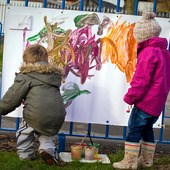 Brushes and Mark Makers (£15), Brush Painters (£8), Easy Grip Pattern Makers (£2.99), Compact Hand Sprayers (£5.49), Paint Squirt Bottles (£1.99), Fine Motor Mirror (£39.99), Palmar Grasp Brushes (£2), Mark-Making Stations (£59.95), and Giant Art Canvas (from £18.99), all from Cosy.
Brushes and Mark Makers (£15), Brush Painters (£8), Easy Grip Pattern Makers (£2.99), Compact Hand Sprayers (£5.49), Paint Squirt Bottles (£1.99), Fine Motor Mirror (£39.99), Palmar Grasp Brushes (£2), Mark-Making Stations (£59.95), and Giant Art Canvas (from £18.99), all from Cosy.
Toddler Whiteboard (£99.95) and Jumbo Chalkboards (£179.95), both from www.tts-group.co.uk.
Bottleheads (£3.50), from www.yellow-door.net. Screw the different tops onto a bottle to transform into a mark-making tool.
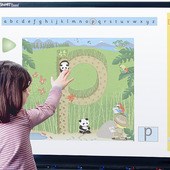 Come Alive Phonics (from £500) makes a meaningful connection between gross motor and fine motor as children can practise letter formation on a large scale using the software on an interactive whiteboard. See www.yellow-door.net/come-alive-phonics/interactive-cd-rom and www.yellow-door.net/come-alive-phonics/sing-and-play-pack.
Come Alive Phonics (from £500) makes a meaningful connection between gross motor and fine motor as children can practise letter formation on a large scale using the software on an interactive whiteboard. See www.yellow-door.net/come-alive-phonics/interactive-cd-rom and www.yellow-door.net/come-alive-phonics/sing-and-play-pack.
Other activities
Cooking - food preparation in the snack area or baking activities gives children the experience of handling a range of tools for different purposes. Try the Basic Cookery Set (£29.99) or the Alfreton Cooking Basket (£34.95), both from Cosy.
Woodwork - try the Real Woodworkers Starter Kit (£29.99) from Cosy.
AGES AND STAGES
The development of a child's fine motor skills is a gradual process.
Birth - babies have no control over their hand and arm movements.
By six months - most babies are able to use both hands to hold and grasp objects.
By 12 months - the bones in their wrists and hands will have begun to harden, which allows them greater control and movement. They begin to pick up small objects, use their fingers to point, and deliberately bash together two objects.
By two years - most children have developed a range of manipulative skills. They can turn pages in books, make marks on paper and put together a simple jigsaw.
HAND MOVEMENTS
The human hand is made up of 27 small bones, which are moved by 37 skeletal muscles, connected together by tendons. Receptors in the skin detect five different types of sensory information - pressure, heat, cold, pain and light touch - but it is only when feedback from the hands and mouth is combined with information from other senses and parts of the body, that we can achieve the accuracy of action that we demand of our hands.
- Palmar grasp - using the whole palm and fingers to pick something up (approximately six to eight months).
- Pincer grasp - when a child can pick something up between their thumb and tip of the index finger (approximately one year).
- Pencil grip/control - a pencil held between the thumb and forefinger with the pencil resting on the third finger. The thumb and forefinger should be able to move slightly so that very fine movements required for writing are possible.
CASE STUDY: CLEDDENS LEARNING AND CHILDCARE CENTRE
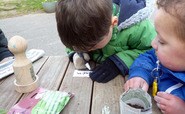 Practitioners at Cleddens Learning and Childcare Centre in East Dunbartonshire were so keen to engage boys in writing opportunities throughout the nursery that they enlisted the help of Alice Sharp, managing director of Experiential Play.
Practitioners at Cleddens Learning and Childcare Centre in East Dunbartonshire were so keen to engage boys in writing opportunities throughout the nursery that they enlisted the help of Alice Sharp, managing director of Experiential Play.
Ms Sharp, a training provider who has a long-standing interest in fine motor movements in children from birth, says that children are spending more time sedentary - watching TV or playing on tablets - than they once did and their fine muscle skills and gross muscles don't seem to be developing as much.
'Most of the writing areas I go into at nurseries are filled with pens, pencils and paper,' she says. 'While that's really important, if a child isn't ready to write they can't manipulate their pencil properly. They need more mark-making opportunities than just pencils and pens. When I observe children, interact with them and exchange play with them, I notice how challenged they are in smallness of movement when using fine motor skills.'
Leona Stewart, head of the 113-place local authority nursery, says that the writing area was very product-led with everything leading to an end result on paper. 'It wasn't attracting as many boys as we wanted so, with Alice's help, we made some changes. The whole process made us evaluate if the children were actually physically ready to be challenged in writing and we realised that it was important to offer plenty of opportunities is all areas of the nursery for them to build up their fine motor skills.
'We are fortunate to have a large outdoor area with trees to climb where children can develop their gross motor strength. We also have a mud kitchen where children can fine tune their small muscle movements using whisks, spoons and utensils to stir potions. They also do lots of planting seeds in the garden and watering.
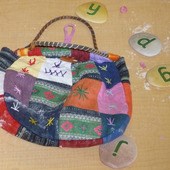 'Indoors, we introduced more resources like small purses with different fastenings - zips, buttons and Velcro - and we place resources inside them so that children have to perform a small physical manipulative effort to get inside. This not only helps strengthen the muscles but encourages children to use their pincer grip. In the painting area, we bought large brushes to help build up the muscles in the arms; we introduced plungers in the art area and small tweezers for children to pick up variety of items - from soft pompoms to small beads; we added turkey basters to the water and painting areas and we bought interesting, unusual tins and boxes in a variety of sizes for children to practise screwing and unscrewing lids. In the writing area, we've put our resources into small craft bags, which children have to unzip to find out what's inside.
'Indoors, we introduced more resources like small purses with different fastenings - zips, buttons and Velcro - and we place resources inside them so that children have to perform a small physical manipulative effort to get inside. This not only helps strengthen the muscles but encourages children to use their pincer grip. In the painting area, we bought large brushes to help build up the muscles in the arms; we introduced plungers in the art area and small tweezers for children to pick up variety of items - from soft pompoms to small beads; we added turkey basters to the water and painting areas and we bought interesting, unusual tins and boxes in a variety of sizes for children to practise screwing and unscrewing lids. In the writing area, we've put our resources into small craft bags, which children have to unzip to find out what's inside.
'We use finger puppets in the writing area along with stories. For example, after reading The Huge Bag of Worries by Virginia Ironside, children use the puppets to talk about their own worries.
'We try as much as possible to build it into lots of different activities so that children are using their fine manipulative skills without realising it. For the children who don't want to write or draw, these activities ensure that they are still developing these muscle skills without it having to be a drawing or a writing activity on a piece of paper.'
 TTS Group has worked with Alice Sharp to develop:
TTS Group has worked with Alice Sharp to develop:
- a set of eight Explorer Pockets (£39.95), made from different fabrics and textures with different fastenings ranging from ties, zips, buttons and Velcro.
- Fine Motor Skills Bags Set 1 (below, £129.95), a set of five bags complete with practical activity notes for practitioners and parents, along with resources such as pegs, threading beads, weaving ribbons, trigger sprayers, pom poms and scoopers.
- Fine Motor Skills Bags Set 2 (£129.95), five bags for practising pincer grips, tripod grips and developing hand arches. It includes tweezers, paintbrushes and squeezy droppers.
All available from www.tts-group.co.uk.



